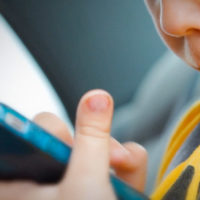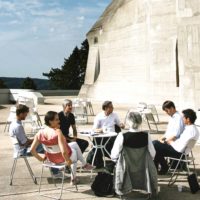From February 27 to May 27, 2019, Johannes and Manuel Sturm hiked 1009 kilometers together through Israel, on the mythical Israel National Trail. A conversation about the journey of father and son together, towards each other. The questions were asked by Wolfgang Held.
How did you come to decide to go on a desert hike together?
Johannes Sturm Manuel had already been on a trip around the world for a year. We met in Mallorca and I told him that I was taking a hiatus from work, the first in my teaching career. He said: “If you go on sabbatical, then we will go on a long hike together!” The idea was born and indeed became real! Manuel researched the most beautiful hiking trails in the world and suggested the Israel National Trail.
Manuel Sturm There are different levels. One of them was the idea of walking for a long time. I had encountered this on my trip around the world, through people who had done the same. Also the idea of doing it with my father. I am interested in the work of fathers and sons. This was what I encountered on my trip to New Zealand during rites of passage of tribal cultures with fathers and sons. And I found it interesting as a therapeutic idea to introduce something like this in Europe as well. The hike was a debut. The third level was the choice of country, Israel, the desert, a place that we both didn’t know.
Father and son is an exciting topic. What touched you in this?
Manuel There are two aspects to this, too. What I understood about the father-son relationship was Freud’s idea that, as an adolescent, you want to push your father away. This is followed by a phase of conflict with the father, where you want to build as much distance as possible, for example: “I will never become a teacher!” You seek to find your own identity. Then you start building your own house, your own life, and you return to your father, transformed. You can build a new relationship. These are unconscious processes, both the separation and the rediscovery. I find that exciting! In New Zealand, they have camps for young people. They go out overnight, make a fire, and guard it. The fathers are there, observing how the young people do this on their own. This is how they mark the separation. For me, it was about the other aspect, that of rediscovering the relationship and deepening it. This is research for me. During my years of puberty, there were always strong clashes between Johannes and me. Only later did I realize what marks this had left on me, and how it influenced me, time and again, in my adult life. With the help of a therapist, I was able to make a change. On a hike, I read a lot to Johannes from a very emotional letter. This first short hike already deepened our relationship and we developed a lot of support and inspiration for each other.
Johannes Manuel found a map of Israel in his New Zealand diaries. He had completely forgotten about it. There, the path was already marked. We were able to follow this outer and inner path because we had both prepared a lot before. I, too, have done inner work of transformation and forgiveness.
Manuel And we made the conscious decision to say everything that comes up. Radical honesty.
Johannes In addition, I was not able to go through this transformation with my own father.
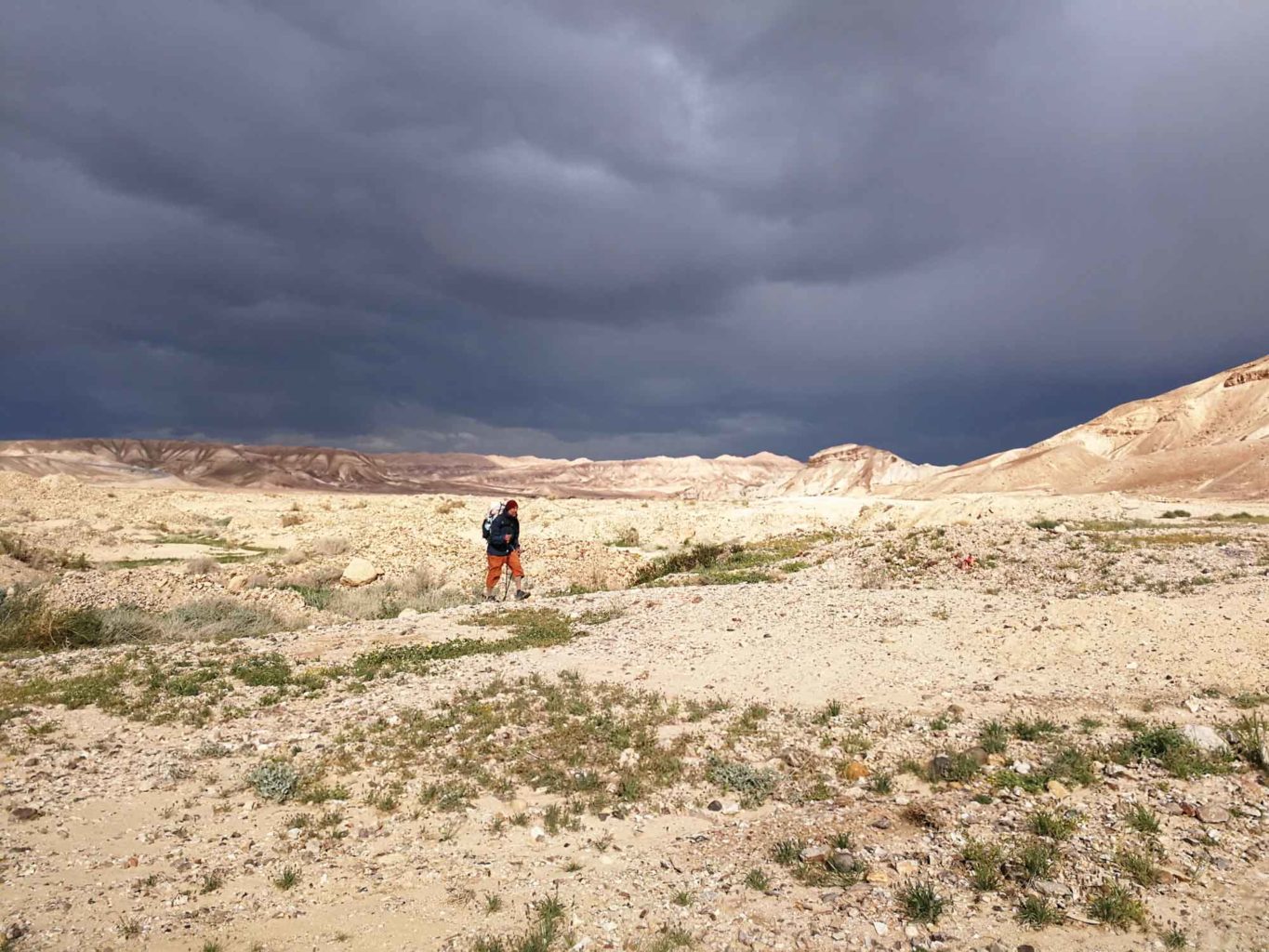
Manuel
Being a guardian
I ask my dad to be a guardian: a guardian of my patience. To remind me that I want to learn about patience. And a guardian of my gentle will. To remind me in those moments when it is necessary that I want to turn my hard will into a gentle one. Because of this personal mission alone, I made the commitment to him. These are questions, developmental tasks that I ask of myself, that I would like to share with others and where I ask them to be a guardian for it. Do not judge me, but accompany me in my struggle. Perceive with interest: progress, setbacks, standstills. Look at me from the angel’s view. We decided on interest, objectivity, and strict honesty. We wanted to listen to how these questions would change. And they did! In the end, in the north of Galilee, we came back to the guardian questions.
How did the decision come to life?
Johannes We felt that life, fate, pushes us to go on this journey. Life wants it – that’s what we both felt. I then traveled to him in Holland and we did a preparatory hike in which we looked at our fears, questions, everything that may come up. We asked ourselves, “Would you make this trip just because of me? What are you most afraid of? What are you most looking forward to?” We tried to talk about it as honestly as possible – even where we were not clear ourselves. I observed how Manuel – and this impressed me deeply – got in touch with the situation, from a perceptive feeling. I asked him how he did it. And he didn’t know. I told him that it took me 25 years to get to this point. These conversations gave us the foundation. Then we made the decision and booked the flight.
What surprised you about each other during the planning?
Manuel We also talked about our physical condition during the preparation. And I realized that there was a chance that my father could physically not manage it. For a child, the father is the strongest man in the world and now, this is no longer the case.
Johannes I was also afraid that I could be a burden to him!
Manuel is a grown-up. You, Johannes, are still fully entrenched in your professional responsibility. Had you found the ideal time for this?
Manuel It was clear to me that this trip could only take place now because this window of opportunity is not open for long to do something like this. I don’t have any children yet; once I have children we can no longer do this. Or Johannes will be too old to hike for three months and sleep on the floor. I believe that we can trace many problems in the world back to too much resentment between father and son. Forgiving each other is the archetypal reconciliation. That you realize why and who started the father-son-war or maybe not. Forgiveness sets the seed for peace. It was also on our mind that this should also inspire others. Actually, we had many interesting conversations with people about it on the trip.
Johannes Along the way, we also met with dramatic situations. The filmmaker from Tel Aviv, for example: he was so impressed that he immediately called his father, who did not understand what this was all about. This walking together and towards each other is important, it is about the relationship, not about arriving somewhere.
Manuel Johannes sprained his ankle and it did not want to heal. That’s when I got impatient because I wanted to continue. I then went hiking alone for a day and realized that this was not the point, and decided that, whatever may come, I would stay with Johannes for the three months.
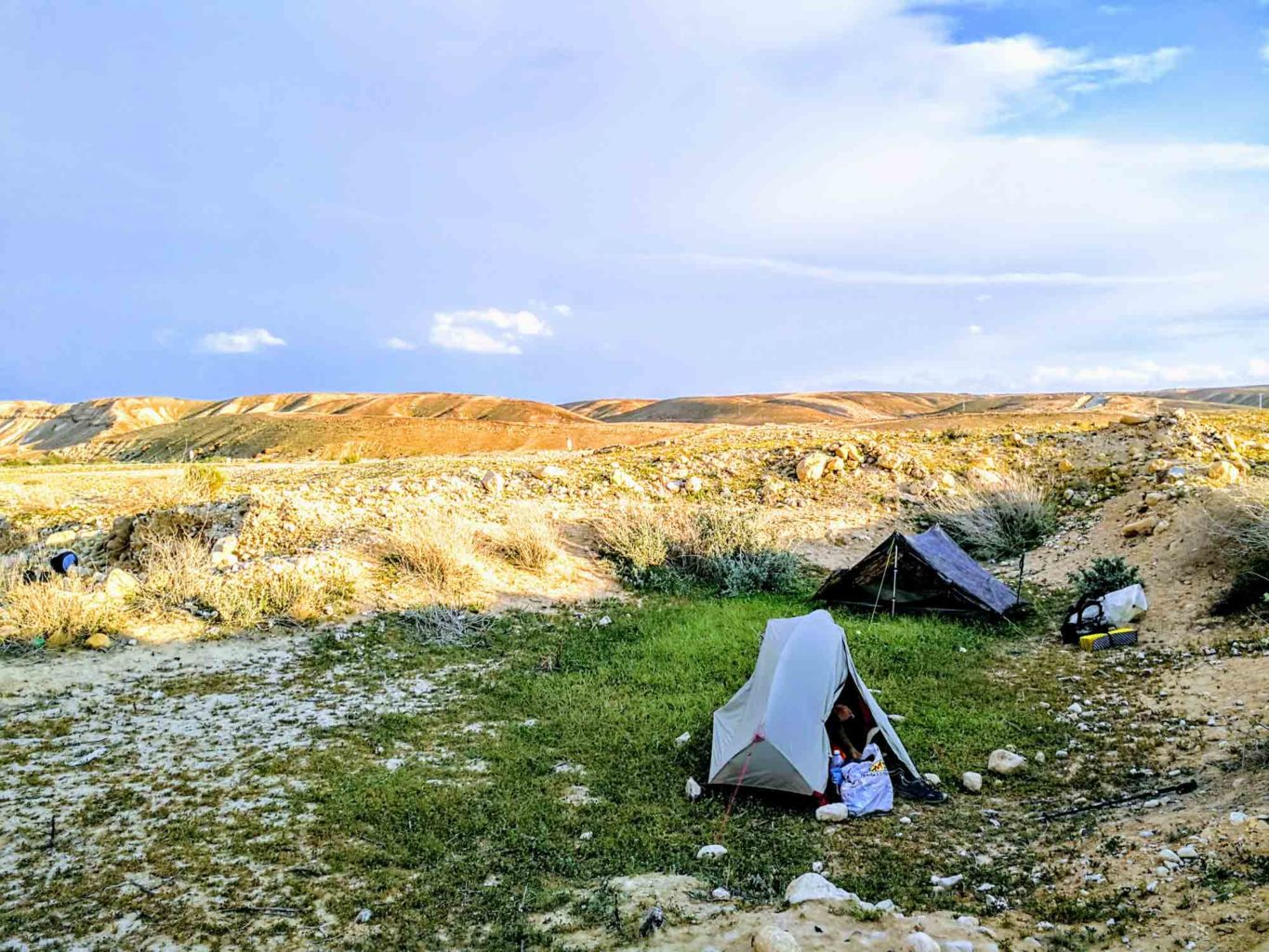
Johannes
Without words
Often we had to look for a place to set up our tents. How do you come to decisions that are right for both of you without having to go through tiring discussions? We noticed that we could rely on our own perception of the atmosphere of a place and that we had similar impressions independently of each other. If one of us didn’t feel comfortable, then we kept looking. This happened once in the North: We descended into a narrow canyon in the twilight. Wonderful nature all around. Near the stream: wild boar tracks. Then we heard them. Very close. It was clear to us: we would go on. Then the path led steeply upwards. In the moonlight on a hilltop. One, two trees. Here. One of our most beautiful, atmospheric places. Less and less we felt the need to discuss such things. Often a glance was enough. Then I realized that we also used this kind of perception for social situations. Spontaneously we bought someone shoes, gave away maps, invited them to eat with us. We made quick and nuanced decisions, sometimes also unusual ones, and we had confidence in them. This experience strengthened the trust in each other and a kind of common vibration, synchronicity emerged. In walking, listening, letting be, being able to wait, giving space and time, caring for each other.
A journey means loneliness and at the same time extreme togetherness. How did you experience that?
Johannes Manuel’s problem was always that he had too little time for himself, because of fellow hikers, too. A few times we separated for a day. The Israelis scolded us for leaving the son alone in the desert or he leaving the father. Having two tents was important. The fact that Manuel sometimes ventured out on his own and did something with people without me being there was very important. At the same time, I was worried whether I was giving Manuel enough space. And: I wouldn’t have dared to go on this hike alone. The steep climbs, for instance. Manuel gave me the courage to try it, carrying 18 kilos of luggage.
Manuel In the last ten years, we have always had a distance of 1.000 kilometers between us. These distances have also made us want to be together.
Johannes One has the greater movement of the whole and the smaller movement of the day, where we kept having intensive conversations. When we prepared the trip, we thought of 77 questions and then pulled out one of them every morning. This was then our question of the day. And then there was always the moment when it was time to stop talking, and we learned to be silent together.
How did you carry your wife or mother with you on that journey: in your heart, in your mind?
Manuel One of my fears had to do with my mother or my girlfriend, but also with my siblings. If I spend such an intense time with my father, there could also be envy. To a certain extent, that was indeed the case. We had three months of preparation and then a three-month journey. So we had half a year where we just looked at each other and after each other and all the other family members faded. I think we managed to make sure that no harm was done. But there have also been frictions and tension.
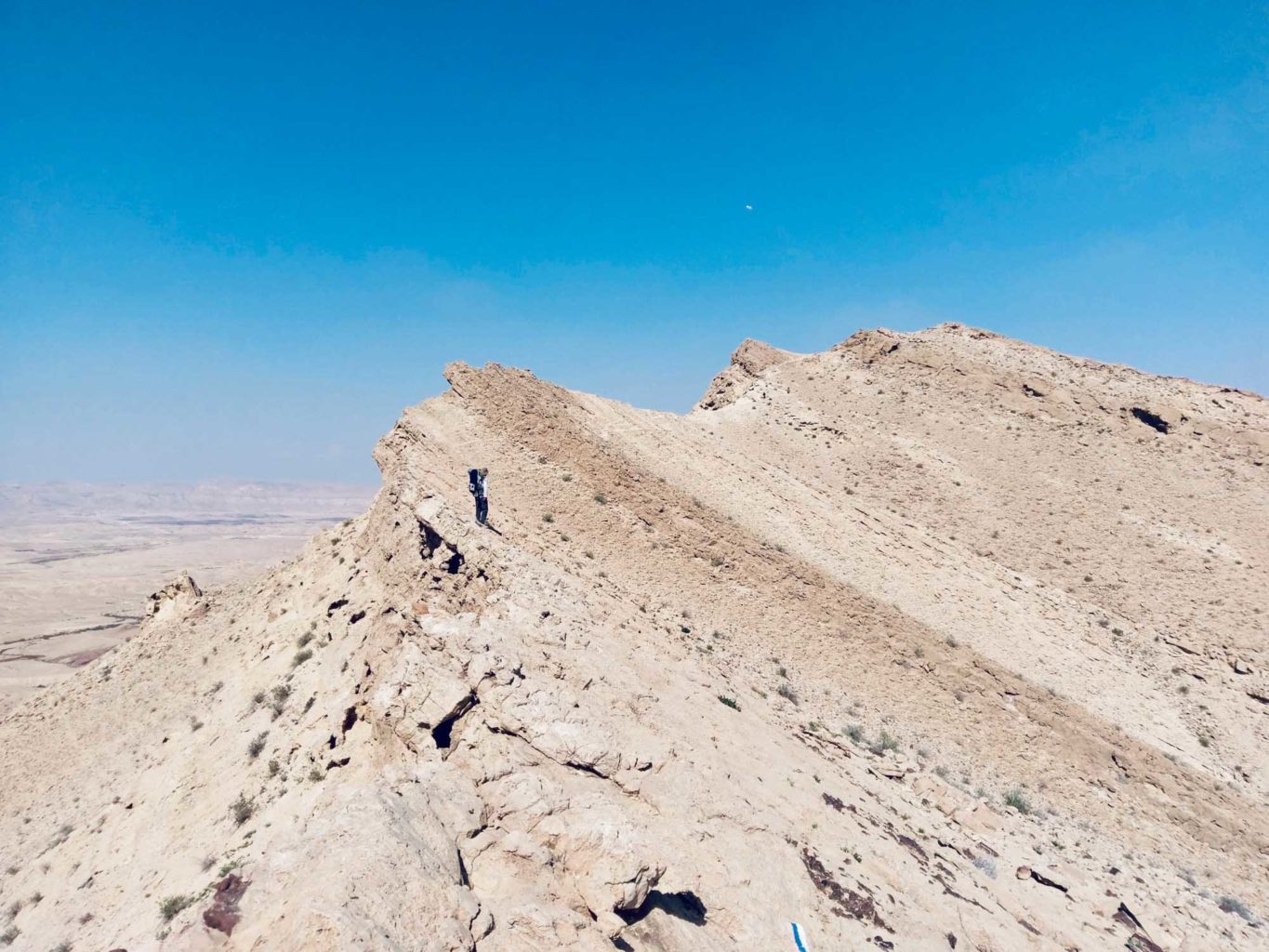
Manuel
I am afraid of you
On the 21st day of our journey, I went downright crazy. I screamed and cursed and shouted. I must have looked like an aggressive dog! Luckily we were in the middle of the desert. I was angry with my father. In my eyes, he failed to take the perfect portrait of me. I explained it to him time and again, which only made him more insecure. I really didn’t think I could make my dad feel insecure. No, only he can do that to me, right? Later he told me that he was afraid of me. I observe how my thinking does not want to accept what I hear. But the emotional reaction of my body, the eyes that well up, teach me otherwise. I am taken aback. How do I affect him that he is afraid of me?
Collaboration always means excluding third parties, and this is nowhere more apparent as in your project.
Johannes We had talked to Lina and Matthias, Manuel’s siblings, and asked them how it was for them. We have a quiet awareness in our family of what everyone needs. This helps to understand that each of us is different. The two also expressed that they would not choose this kind of togetherness. When we came back, my other two children came up with suggestions on how we could work on our relationships. We also talked to them on the phone and sent videos. And we have been able to clarify many things in the other relationships. I had previously been in Asia with my wife for three months. That meant that she could let go completely.
Manuel By and large, we communicated everything transparently and discussed everyone’s feelings.
This country is like a nucleus of the earth. Was there a moment when you were able to say, now we have arrived?
Johannes When they took our pocket knives from us in Beer Sheva?
Manuel Actually, as early as in Amsterdam at the airport, when they searched our suitcases.
Or when we were honked at because we didn’t drive over an orange traffic light. You immediately noticed that you were in a different world. We arrived very fast, were quickly in the flow. In the desert, we hitchhiked to hide food at selected places because we could not carry everything. The driver asked why. Then he suggested to hide it with his parents and we should get it back from there, which really worked well. Generally, we got an incredible amount of help.
Johannes I have never experienced so much hospitality.
Manuel There, you can walk off there unprepared and be on your way. It only takes a day and you have everything you need because you get help everywhere.
Johannes It took a week to get into the daily rhythm: setting up the tents, eating, hiking, taking down the tents. The rhythm carries you and we realized that we could leave out sections because the rhythm was there.
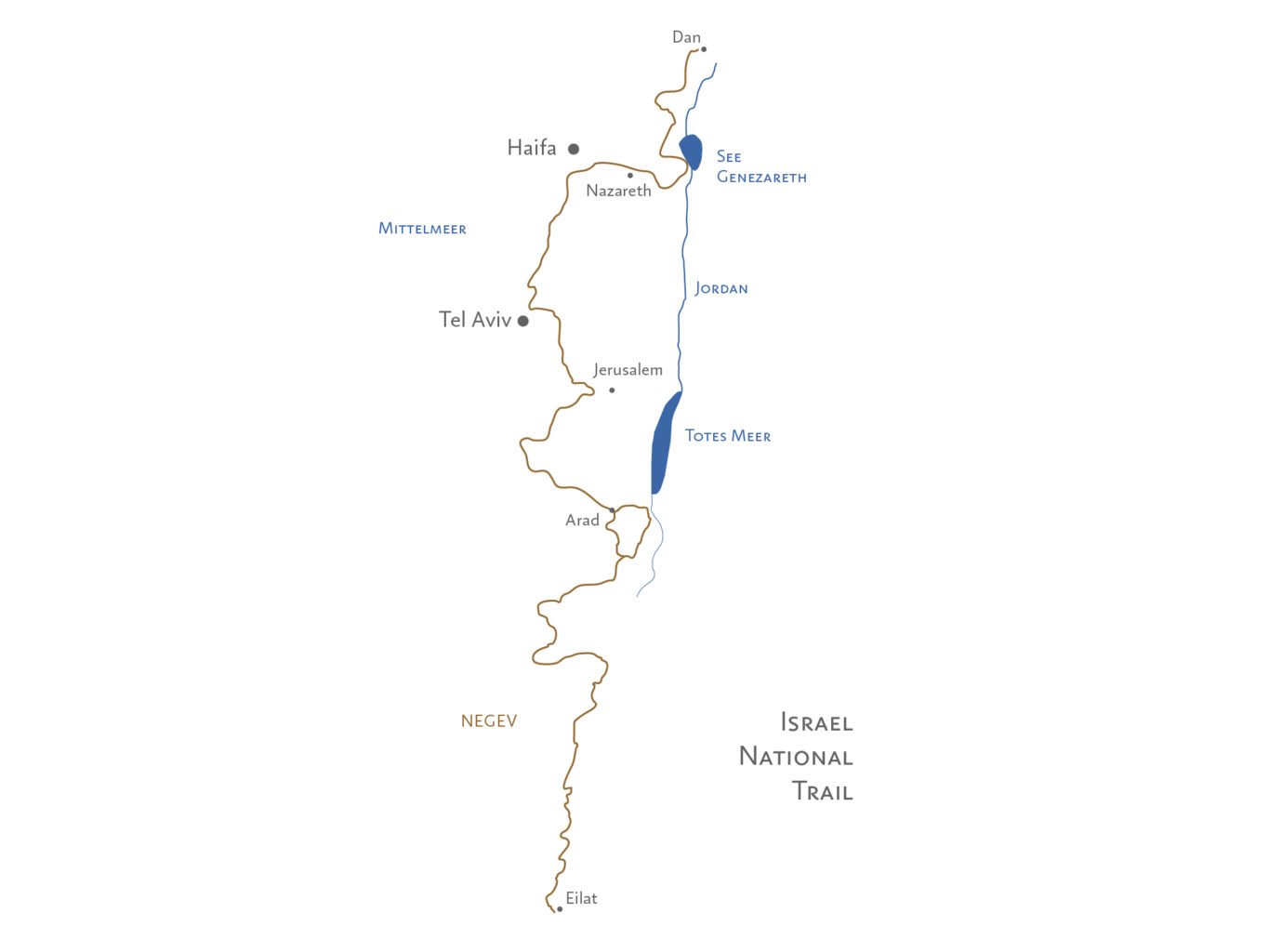
Do you sense there that Israel is the center of the world, of the Earth, the Promised Land? Or is that a cliché?
Manuel I would say you can feel that clearly. It’s like a volcano jutting out of the earth, especially around Jerusalem. There is a sizzling in the air. It is also incredible how alive spirituality is there. Not just the Jews. Everyone is somehow on a spiritual path, no matter in which direction. Most are believers, spiritual, or reverent in one way or another.
Johannes And surprisingly tolerant.
Manuel You see images that you don’t see in Switzerland: construction workers roll out their carpet on the street in their lunch break and pray. You walk past them and it is totally normal, it doesn’t surprise anyone. It has to do with this aura, these forces.
Johannes When you ask where someone is from, they tell you where their ancestors came from. The whole world is coming together there. The transitions in the landscape from desert to steppe are another thing. That totally impressed me. The transition down to the Jordan Valley, this closeness of the very different landscapes. Or the granite in the South.
What did the desert tell you? It is no coincidence that all religions begin in the desert.
Johannes The desert threw us back on ourselves and it made the relationship with fellow hikers the most extreme experience. The return to what is most important to ourselves and to the relationship.
Manuel I was in the Sahara at the age of 14 and the longing for the desert stayed with me. This barrenness, the wind, the being thrown back to oneself. The winter snow desert in Sweden has the same effect. It takes you to a significant, an essential place. The Negev desert is very varied: canyons, gorges, trees, ibexes, people. Plants grow there in the summer, foxes rummage through the backpacks at night, there are Bedouins, ashrams with hippies right next to military bases.

Manuel
Time, distance, water, food, weight
We hiked for 51 days and needed an additional 28 days for rest, discovery, and recovery from injuries. We walked about 20 kilometers a day. Once we walked 37 kilometers. Our rhythm: walking, eating, walking, sleeping, walking, renewing supplies, moving on. We spent 50 nights sleeping in tents, the rest with friends or ‹Trail Angels›. In the desert, water is everything. We hired someone to hide some for us and find it thanks to the GPS coordinates he sent us. Sometimes the water is
What was the strongest borderline experience for you in these three months?
Manuel Once, when it got really hot. We were in the North and out of the desert, at the Sea of Galilee and the Jordan River. It was 43 degrees Celcius (109.4°F). Even at 35 degrees Celcius (95 degrees Fahrenheit) you can no longer walk properly. We were forced to rethink our rhythm. I was much more irritable. One keeps thinking of water. I was also concerned about my father. I noticed that his thinking diminished, became irrational. I felt responsible for Johannes and was worried. And then, one night, when we heard shots quite close, I asked myself if it had been a mistake to come here. I was scared myself. You notice when the body comes to its limits, that it wants to go into one of three modes: fight, flight, or freeze. That was a borderline experience.
Johannes I can certainly confirm the physical side. In the North, there were more such borderline experiences than in the desert. But the injury to my foot, an inflammation of the tendon, was also intense because I felt like I was locked up. I was desperate. I knew I had to let Manuel go. And when he came back and decided to stay, it was one of the most important experiences of happiness and trust for me – indescribable.
There are always guardians at borders. You chose/found the motif of being guardians for each other. Bodo von Plato once said in an article that relationships today are no longer there so we don’t feel alone but so we can be guardians of the other’s loneliness. Could you say something about that?
Johannes This is something that evolved even before in the course of our relationship work: The most modern form of mutual companionship is not to give advice but to be a guardian for each other’s questions – completely individual. One asks how the other wants to be accompanied. You are free, you can ask and you can also refuse. Following this notion, we thought that we would take questions with us, each of us three or four questions. I have now given my new guardian questions to my wife as well as my daughter.
Manuel For both of us, the hike was one of intention. The difficulty is always that, as an adult, you don’t want to be told so much by your father. And vice versa. One is rather reluctant to interfere in the life of the father or the son. With these guardian questions, one allows the other a new conscious access. Here, he can keep an eye on what’s going on, give feedback. You open a door for the other, where it is otherwise rather difficult to enter.

Manuel
Shots at night
Adrenaline kicks in, my heart is racing. Where am I? Sleeping bag, tent, oh yes, I’m in the desert, one day away from the next city. What was that noise that woke me up? Fireworks, right? Night. It is pitch black. I hear voices. Someone reloads a firearm. Even more shots. I whisper to my dad in the tent next door, “What should we do?” A whisper: “I have no idea.” I whisper back, “Lie down. Keep calm. Put on your shoes and clothes, take the flashlight, be ready to run or fight.” In the last 30 days we had crossed the desert, climbed ladders, swam through flooded canyons, hiked 32 kilometers in 32 degrees Celcius (90 degrees Fahrenheit), came close to dehydration, saw jackals and scorpions, maybe even a wolf, and last night a never-ending thunderstorm that turned the desert into mud. But now it’s the first time that I think it was stupid of me to have put my dad in this situation. The voices move on. A little later again shots, about 500 yards further. Paradoxically, I feel relieved.
Did that work well for you?
Manuel Yes, and we are still doing that.
Are there images, moments that remain from your journey?
Johannes The experience of trust, being able to perceive a destiny moment. There were examples where we tried together to enter into a flow.
Manuel For me, it was the realization: My father can also be afraid of me. I would never have thought that before.
What flavor, what echo did the journey leave?
Manuel I was quite inspired by celebrating the Sabbath. To pause once a week, not plan anything, be in the moment. And: No phone, no internet. I have taken up this impulse: I do not use my phone or the internet on Saturdays. One day a week where I’m not caught up in the daily routine. This is the flavor of the journey that still lingers
Johannes What reverberates for me is the feeling of understanding one another without words. When we were at the wild boar place, where we thought about setting up our tent. We got into a state where I took what my son said very seriously. Often one look was enough for a joint decision. The kind of awareness and mutual trust that the other is also aware. That is not a matter of course.
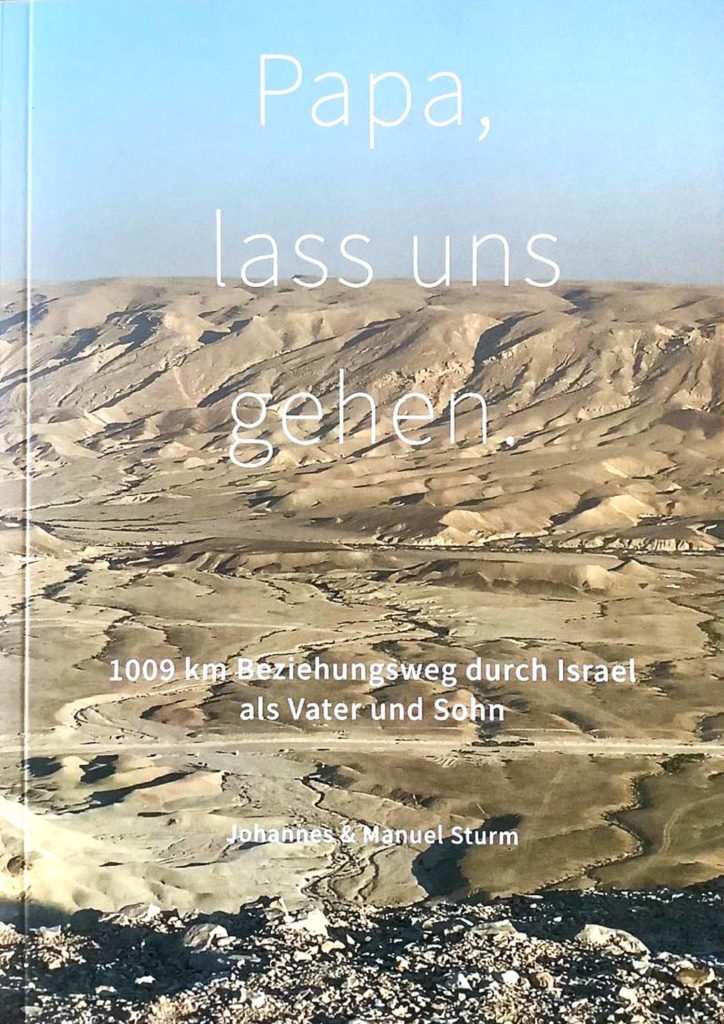
What is your advice for such journeys, such fostering of the father-son relationship? You have turned it into a book you want to share your experience with others.
Manuel I think the title of the book sums it up well: ‘Dad, come walk with me’. That the relationship between father and son is understood as something dynamic, as a path with common intention. It goes through phases that can be consciously taken hold of.
Johannes That we set out on our way, towards each other, with each other – again and again. Yes, and that is always a journey to oneself.
Johannes and Manuel Sturm have written a book about their journey. If there is interest, they will print more copies or send a PDF file. They also documented the journey in a movie: Youtube
BookPapa, lass uns gehen (2021, German Edition); Dad, come walk with me (2021, English Edition)
Kontakt j.sturm@posteo.de











